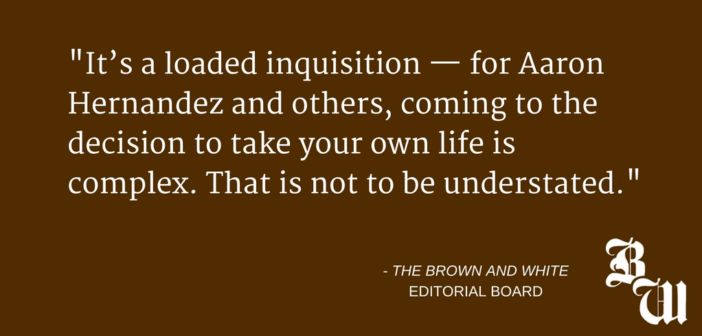Sonder – n. The realization that each random passerby is living a life as vivid and complex as your own.
Aaron Hernandez was found hanging from a bed sheet in his cell Wednesday, and the internet reacted. Users hypothesized what path his career would have taken if he had continued on at the NFL level. It recognized the way he got out of a life sentence. It explored the legal implications of his appeal on his homicide charge.
The scope of the reporting was wide, but it left one question unanswered: Why?
It’s a loaded inquisition — for Hernandez and others, coming to the decision to take your own life is complex. That is not to be understated.
Amid the curiosity of this “why,” there was speculation. There were retrospective claims of Hernandez acting differently in the days leading up to the suicide. However, there was still mystery surrounding his motives. Hernandez was found not guilty of double murder just five days before he took his life. He teared up as the verdict was read.
But the situational inputs surrounding Hernandez’s suicide cannot possibly be evaluated like a mathematical equation. An attempt to turn the investigation into a one-dimensional cause and effect would be immature.
That is where sonder comes in.
Embracing sonder doesn’t mean conceding your understanding because it is too difficult to truly experience another person’s struggle. It means reminding yourself that just as you have individualistic thought processes that involve difficulty and imperfection, so does everyone else.
Hernandez, no matter what he did, has a complex story just like the rest of us. His interwoven networks include a family consisting of a fiancée and a 4-year-old daughter.
While the common reaction to the news of his death was to conceptualize a hot take based on his vilified celebrity status, hardly anyone thought about his human qualities. Yes, we should be apprehensive to treat violent criminals with compassion and empathy. However, we can certainly benefit from having the perspective to dive deeper.
We can think about the brain trauma many current and former NFL players have dealt with, and how chronic traumatic encephalopathy has been linked to erratic behavior and thoughts of suicide. We can consider the heavy financial burden the legal system has put on Hernandez and his family. We can try to put ourselves in his shoes.
Of course, this concept extends far beyond just humanizing Hernandez. What about others surrounding his situation, like the homicide victims and their family members? Even further, what about the people in our own communities?
There is such a strong urge to package people based on stereotypes we form from our observations. At Lehigh, we unapologetically stereotype our fellow classmates all the time. But how would you feel if you were boiled down in such plain terms?
You’d most likely feel overlooked because we know deep down our motives are complex and do not necessarily come across with every outward action we take.
And in that moment, you’d realize how important the concept of sonder is.






Comment policy
Comments posted to The Brown and White website are reviewed by a moderator before being approved. Incendiary speech or harassing language, including comments targeted at individuals, may be deemed unacceptable and not published. Spam and other soliciting will also be declined.
The Brown and White also reserves the right to not publish entirely anonymous comments.